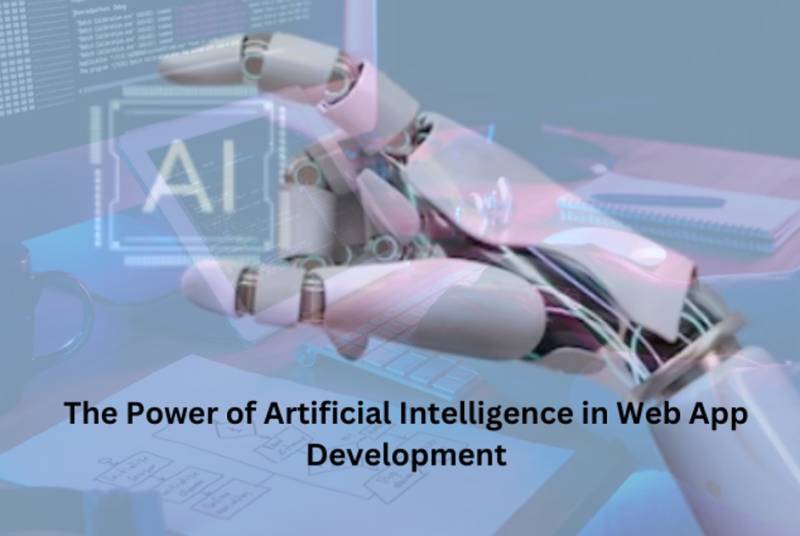The Role of Artificial Intelligence in Web App Development

Artificial Intelligence (AI) is a rapidly evolving technology that has been revolutionizing industries across the board. In particular, AI is transforming web applications development, making it more efficient and secure.
From voice assistants to chatbots, AI is empowering businesses to provide personalized user experiences through their web applications. Various AI technologies like Machine Learning (ML) and Natural Language Processing are being used to create web apps with advanced features, capable of understanding user intent to provide personalized experiences.
Some real-life examples of AI-enabled web apps are Google Assistant, Amazon's Alexa, and Google Translate. In 2022, the global market size of artificial intelligence was valued at $136.55 billion, and is forecasted to grow by a CAGR of 37.3% between 2023 and 2030.
That means, more brands are warming up to and utilizing AI to enhance the functionalities of their web apps. However, some challenges are still associated with this rapidly evolving technology, which can only be overcome with human assistance.
In this guide, we’ll explore how AI can be beneficial in developing modern web applications with enhanced functionalities, and why you should utilize it with a ‘human-in-the-loop’ approach to overcome its ethical and technical limitations.
Key Roles & Benefits of AI in Web App Development
The biggest role and advantage of using AI in developing web applications is that it streamlines and simplifies the development process through automation.
In web applications, the user interface is at the forefront, and AI helps to optimize it for a personalized experience.
Here are some more benefits and reasons to utilize AI for web development:
1. Improved Voice Search
With voice search growing and slowly replacing the traditional text-based search method, web applications need to understand user queries and their intent more clearly to provide relevant results.
That is achievable by using AI technologies like Machine Learning and Natural Language Processing like GPT to train a web application to recognize patterns in user behavior and predict what they want.
AI also generates content summaries for voice-search users to help them understand the topic better. Popular voice assistants like Siri and Alexa utilize AI to provide informative and relevant answers to users for their search queries.
2. Enhanced & Personalized User Experience
AI helps businesses collect and analyze real-time user behavior data and provide personalized recommendations based on their preferences.
Additionally, AI-powered chatbots in web apps provide quick and tailored responses to users by understanding their pain points. This enhances customer engagement and experience, freeing human resources to focus on other crucial tasks.
3. Reduced Development Time, Cost, and Efforts
Artificial intelligence helps to automate time and resource-intensive tasks like code creation, review, testing, and bug detection. As a result, less human resources are required to develop, process, and test the code during web application development. This helps organizations to reduce development cost and time with improved efficiency.
4. Improved Security
AI can quickly and efficiently identify vulnerabilities, code errors, and bugs in large amounts of data. By identifying potential threats at early stages, AI assists businesses in enhancing the security features of web applications for improved performance.
5. Efficient and Seamless Development
AI can easily create fully-functional and custom web applications by generating codes in a lesser time than human app and web developers.
Further, it can also add interactive elements, navigation layers, and other custom functionalities in web applications for quick development.
Top AI-powered Features in Web Apps
Artificial intelligence is powering web applications with advanced features, such as:
1. Chatbots and Virtual Assistants
Do you know around 74% of users prefer AI chatbots to seek answers/responses to their queries? This is because:
- They are more effective in providing quick and helpful responses to users by understanding their intent, preferences, and needs over time. They collect and analyze data from past user interactions to improve their responses.
- They can be used to provide 24x7 support in multiple languages.
- They can handle multiple user interactions simultaneously, allowing businesses to scale without investing in human resources.
Some real-life examples of chatbot implementation in web apps are:
- Walmart’s Chatbot: Allows users to find relevant products in their local stores, place order, check delivery status, cancel orders, and so on.
- Dominos’ Chatbot: Allows users to place, customize, track, and cancel orders.
- HDFC’s Chatbot: Help users set up new accounts, check their account balances, pay pending bills, and more.
2. Recommendation Systems
AI-powered recommendation systems can be integrated into web applications to provide personalized suggestions to users for enhanced conversions. These systems utilize ML and statistical techniques to analyze users' past purchases, search history, demographic information, and other details. Leveraging this data, they suggest products, content, or services that users are most likely interested in for cross-selling and up-selling.
One most successful example of this is Netflix. The popular on-demand streaming platform uses an AI-powered recommendation system to filter and suggest specific content to users based on their past viewing behavior.
3. Image Recognition and Object Detection
AI-powered image recognition and object detection systems interpret and analyze digital images and extract relevant features from them.
Web applications can also utilize AI for real-time object detection in live camera feeds and video streams for surveillance, interactive experiences, and so on.
Google Photos is one popular example of using AI-powered image recognition and object detection features. The application utilizes this feature for identifying objects in pictures for effective data organization and personalized recommendations.
Challenges of AI Integration in Web App Development
While AI is backing web application development with limitless possibilities, there are some challenges with its integration that you should know about and not overlook, including:
1. Data Quality and Preprocessing
AI models require a large amount of accurate, relevant, and structured data for efficient training. Often organizations struggle to access and process training data due to a lack of expert resources.
Annotators who are not experts might show data bias that can hinder the quality of labeled datasets, resulting in poor performance of AI models.
2. Technical Complexities and Infrastructure Requirements
It requires technical expertise to choose the correct AI framework, algorithms, and tools that meet the specific requirements of the web app and integrate them.
Also, to process large amounts of data in seconds, AI models require advanced infrastructure with suitable processing capabilities, which can be a costly affair for businesses.
3. Data Security and Privacy Concerns
As AI models deal with large amounts of sensitive information, data security and privacy are a constant concern for businesses. They need to implement robust data protection measures to maintain confidentiality and mitigate the risk of unauthorized access & data breaches.
'Human-in-the-Loop' Approach to AI Web App Development
If you have wondered if AI will replace human web app developers, the answer is NO. Robots may take away some jobs, but they won't take all the jobs away in web applications development. In fact, robots will create some jobs for humans.
While artificial intelligence is an empowering technology for automating web app design and development tasks, it cannot be used alone for building apps. This is because AI cannot match human accuracy and expertise level when it comes to writing complex codes without errors.
Also, to overcome the challenges involved with AI integration in web apps, human intervention is essential. So, for efficiently developing web applications, it is crucial to use both AI and human-in-the-loop approaches simultaneously.
Here are some best practices to effectively utilize artificial intelligence in web app development following a human-in-the-loop approach:
- Identify suitable AI use cases for your web app
- Choose the right AI models and algorithms for your web application
- Continuously train the AI model with relevant and high-quality data for improved performance
- Keep ethical considerations in mind when using AI for web app development
- Partner with an experienced web application development company to utilize their expertise for creating an AI-powered web app for your business.
Frequently Asked Questions About AI Web Development
Here are some of the most frequently asked questions about AI in web development and their answers:
1. Are there any limitations or risks associated with integrating AI into web apps?
There are certain limitations involved with AI implementation in web application development, such as data bias, technical complexities, data security, and high investment expenses.
For businesses lacking advanced infrastructure and skilled resources, the most viable solution is outsourcing web application development to a reliable third-party service provider that can utilize AI to develop modern web apps.
2. What are the costs involved in implementing AI in web app development?
The cost of integrating AI in web app development depends on several factors, such as the project complexity, the quality and size of data needed for the AI models’ training, and the level of customization and technical expertise required.
The average cost of custom AI solutions can vary between $60,000 to $300,000, including development and maintenance support.
3. Are there any legal or regulatory considerations when using AI in web app development?
Yes! There are legal concerns like data privacy and intellectual property issues that are involved with using AI for developing web applications.
AI systems are protected by intellectual property laws such as trademarks, copyrights, and patents. Therefore, to use it correctly and avoid legal issues, web app developers must be aware of the applicable data privacy and intellectual property regulations.
In conclusion
AI is a powerful technology that helps in building modern web apps with advanced functionalities to enhance user experiences, provide personalized recommendations, and streamline processes. As AI technology advances, we can expect to see even more innovative and user-friendly web apps.
However, there are challenges to address, such as data quality, technical complexities, and ethical considerations. To unlock the full potential of AI in web app development and overcome its ethical and technical limitations, it's important to use it strategically with the involvement of human expertise.
That will help to ensure that AI is used responsibly and ethically to build apps that deliver the best possible user experience.



















![A Parent’s Guide to Having Kids Live an Active Lifestyle [node:title]](/sites/default/files/styles/video_thumbnail_bottom/public/Little%20Girl%20Bike%20Kids%20Live%20an%20Active%20Lifestyle.jpeg?itok=lN-nALtw)
